Doe Paoro is one of the most unique artists I’ve ever come across. When you listen to her spellbinding new album, After, you feel as though you’re listening to music from another world. Or from the future. Probably both. Although familiar instruments make up her sound, you’ve never heard them blended together quite like this. It’s like sipping a truly one-of-a-kind wine with notes of things you’ve never even tasted before. And when you hear her voice, it’s like experiencing deja vu and jamais vu (never seen) at the same time. You feel like you’ve been listening to her all of your life, yet you’re not even sure you’re hearing her now. As she sings her poetic songs, you sense her aura, which is like a color you’ve never seen before, as though she glows like an angel, and it bleeds through her music brilliantly. Her songs are all about the human experience, and in a language you understand, but you might need to hear them several times to comprehend them; they’re like deep poetry you have to think about but once everything clicks into place and you process it, you feel a wave that’s both cool and warm wash over you. Simply put, she’s an enigma.
If what you’ve just read gave you a headache, fear not, the following interview makes much more sense, though it does go to some pretty deep places. My first interview with Doe – from September 2014 – was done via E-mail, but I’ve recently fallen back in love with doing phoners, so I asked her if we could speak this time. Coincidentally enough, she was hoping I’d ask her to do a phoner. It worked out nicely, allowing the interview to shift from traditional Q&A into more of a conversation at times. I think you’ll find it quite interesting.
MM: In the intro for your September 2014 interview, I wrote, “chances are that her next album, due next year, will be released on a hip label like Sub Pop or Anti- or 4AD; somebody sign her now!” And now you’re on Anti-. Did we somehow play a small part in this?
DP: I don’t know, but either way it’s prophetic.
MM: When and how did you come into contact with Anti-?
DP: My manager had sent the record out to the label and they really liked it and responded to it. We’d been talking since before I met you [September 2014] but kind of vaguely at that point. We started speaking, I think, about July 2014.
MM: Have they signed you for multiple albums?
DP: Potentially a second one, yes.
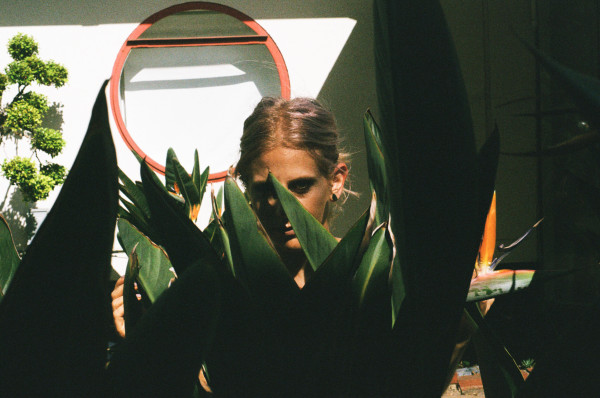
MM: You told us, regarding the fact that it states DOE PAORO IS DEAD on your Bandcamp page, “the old version of me is dead, and there is a new one.” My question is, are you still the same Doe you were when I interviewed you in September 2014?
DP: Yeah, of course not. Definitely not. I think that change is really a constant in my life – and maybe the only constant in my life – I’m too close to say exactly how I’ve changed since then but I’ve moved across the country and I’ve now put out the record, and gone through that process properly for the first time in my life, so there’s been all sorts of new challenges and that’s just the professional ones.
MM: Where did you move to?
DP: I’m out here in Los Angeles now.
MM: Oh, cool. I lived there for a few years. I ended up moving back [to Massachusetts] because of health problems but I’m hoping to move back out there.
DP: Yeah, get the sun.
MM: All four songs from your Ink on the Walls EP made it onto After. Was it always the plan to include them all on your next album?
DP: We weren’t sure. We made twelve songs. And we narrowed it down to ten. And I just felt like those four were strong and important to the narrative of the record.
MM: Did you change them in any way for the album?
DP: We did change “Hypotheticals.” Production changed on that. To get a new spin on it.
MM: Was After entirely recorded at Justin Vernon’s April Base studio or were some songs recorded elsewhere?
DP: It was mostly recorded there and then we recorded a little bit in Minneapolis.
MM: I understand that April Base is actually a house that Justin converted. What’s the vibe like there?
DP: I believe it used to be a veterinarian clinic, so it’s funny that way. It’s really like a summer camp vibe, which allows for this very appropriate sense of play and inventiveness because people are coming and going all of the time, and it’s out in nature and you’re isolated with all of these wonderful people. It’s super creative in that way.
MM: Are they producing a lot of other artists, or is it more like it’s their studio and they just let friends come and use it?
DP: I’m not sure what their plan is with it. I know that they’ve produced some other artists out there in the past, but I don’t know what the future is.
MM: You had some remarkable co-writers on After, one of which is Sterling Fox, who’s previously worked with Lana Del Rey and co-wrote the lead single “Growth/Decay” with you. Was it a difficult song to write or did it spring to life quickly?
DP: No, that song took time. We started writing that song in 2012 and because the structure was so interesting, I was searching for something in the vocals that matched, that could mirror the water element of the song. And that summer I went to India and I think my second day back in New York Sterling and I got together and we finished the song. It really benefited from the experiences I had over there.
MM: How did you come to write with Sterling? Did you know him previously?
DP: No. At the time I had a publishing deal with BMG and they wisely connected us. It was a really intuitive match.
MM: Do you have plans to write with him in the future?
DP: Hopefully. I think he’s very busy now and he’s starting his own little record label, and his project that he’s working on. But we definitely have spoken about it. We both were really excited about the final production on the song.
MM: If Lana Del Rey asked you to write a song with her, would you?
DP: Definitely. [Both laugh.]
MM: If you could write songs with any three people alive, who would you choose?
DP: These are always the tough ones, off the top of my head… Frank Ocean – I think he’s a really good songwriter. Leonard Cohen – I’m not even gonna try to justify that one – and there’s this guy Rick Nowels, who has written some of my favorite songs of the past few years.
MM: He writes with Florence + The Machine, I think, right?
DP: Um, hmm. He’s written with her and Lana again and maybe Stevie Nicks, too. [ED note: He has, in fact, written with Nicks, both as a solo artist and with Fleetwood Mac.]
MM: After reading the lyrics to After I felt like I had just read some brilliant poetry. Do your songs ever start off as poems?
DP: Thank you for saying that. I think, yeah, sometimes they do start off as poems. And with those songs the challenge is how to make it make sense within a song.
MM: Are you a poetry reader?
DP: I am.
MM: What are some of your favorite poetry books?
DP: I don’t know about books, but I really like William Blake and I’ve been reading some Sappho lately and I like some of Charles Bukowski’s poems and someone named Rupi Kaur.
MM: Sounds like you’re quite into it.
DP: [Laughs] And Allen Ginsberg. How could I forget? He’s probably my favorite.
MM: In “Traveling,” you sing about being on the road so long that you’re afraid to stop. Is that how you feel right now?
DP: Well, I haven’t been on the road yet. I’m about to start. I will definitely feel that way. But I think in terms of momentum, yeah. I feel a natural movement [to] live other places all the time.
MM: Where have your travels taken you during the past year?
DP: I haven’t been traveling as much for music this year but I was in Budapest for the first time and Italy for the first time. They were pretty amazing. And Stockholm, actually, I did go to Stockholm for a few days to write.
MM: What were your favorite things about those places?
DP: I think the thing about Europe that always gets me is how much history there is. With Italy, I was actually there with my family, which was so amazing to be specifically there because I feel like family is a big part of Italian culture and a reminder of the importance of that.
MM: I wouldn’t say that After is depressing, because there’s a lot of hope in there and it inspires me in that way, but when I finished reading the lyrics I couldn’t help but wonder if you were in a period of depression when you wrote some of the songs? If you don’t mind me asking…
DP: It’s a good question. I do think there’s a darkness in the record. I was definitely going through a rough period in a lot of the time I was working on that record. Passing through some sadness for sure.
MM: In our last interview you talked about “The Wind,” which features Adam Rhodes. I was only able to find it on Youtube and only after you pointed it out. The Youtube post has a link to iTunes but the link doesn’t work and I couldn’t find it on there. Why isn’t it for sale anymore?
DP: Hmm. It should be for sale. It’s not for sale on iTunes?
MM: No. Not in the U.S. store at least.
DP: I’m gonna have to check that out. It was coming up when you search for Doe Paoro. It should’ve been [coming up] as a single.
MM: It didn’t. I checked a few times. While I was looking for it, I found the RAC remix for “Nostalgia,” and I immediately bought it. I’ve been a fan of his remixes for ages. I love how he always plays the bass guitar in them and tends to make them better than the originals. How did you connect with him?
DP: I was just a fan of his and I sent his manager the song to see if he’d be interested in remixing it. We didn’t have any previous contact before that.
MM: Do you plan to have him produce or co-write any songs with you in the future?
DP: Right now we are exchanging ideas through e-mail about writing a song together.
MM: Are there any other remixes of songs from After forthcoming?
DP: Yes, there’s some good surprises up ahead. We have a few other remixes coming and we’ve also been running this remix contest for “Hypotheticals” through Indaba, which has been really amazing. People are submitting them from all over the world from Lithuania to India to France and it’s just so cool to see how different people are getting it.
[ED: See: https://www.indabamusic.com/opportunities/doe-paoro-hypotheticals-remix-competition/details]
MM: Will any other singles be released?
DP: Not at this point. I mean, who knows? There’s one song that didn’t make it that we could potentially release as a single, but I think that this batch is finished.
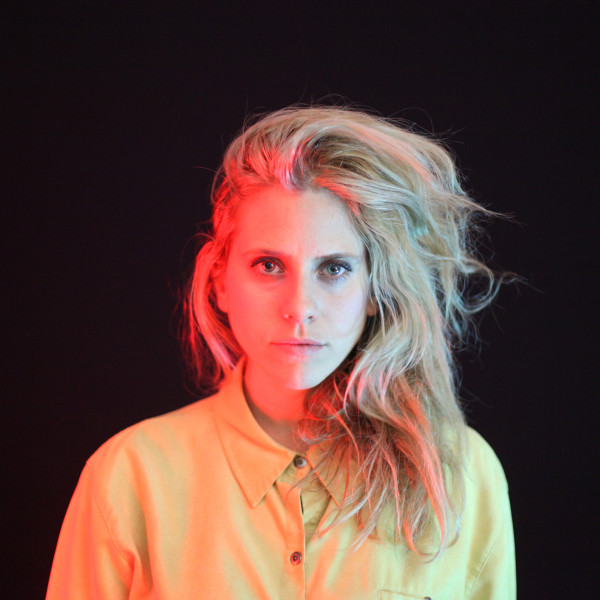
MM: Have you written or recorded anything for your third album yet?
DP: Yes, I started writing for it. This one took so long. I think a lot of artists with their second record get in a stagnate place because they’re in a position with a record deal and trying to figure out the structure of being a musician, if they didn’t understand before. All the logistics. It can really take a while. Now that I’ve got it started, I feel free to roll with this new idea that I have.
MM: Is it in a drastically different direction?
DP: No, I think it’ll just be… Who knows what it’ll be?
MM: Have you been an opening act for all of your shows this year or are you doing headlining shows now?
DP: We did a headline show in LA and I think we headlined in New York this year but, otherwise, we’re supporting. Although we’re very likely going to be touring in the UK as a headlining act.
MM: Have you done any festivals?
DP: We did Osheaga in the past and, of course, South By South West, and CMJ.
MM: If you started headlining today, who would you want to open for you?
DP: Oh, wow. Um, you know, it’s probably somebody I don’t even know about yet. I feel like the people who are opening are always still developing, so a lot of people haven’t heard them yet. They’re doing things in the future because they’re not tied to past identities. They’re putting out their first product. And that’s always really exciting.
MM: I know your album came out in late September, but is it out on vinyl yet?
DP: It is.
MM: Cool. I’ll have to order it. I was just wondering because I know smaller labels have been having trouble getting things pressed because there are only so many places that do it and they’re taking these larger orders from the majors now and give them priority over smaller orders.
DP: Wow, that’s too bad.
MM: If you happen to know, where were the vinyl copies of After actually pressed?
DP: I don’t know. I should know that, but I don’t know.
MM: I was just curious. I’ve been reading so many articles about vinyl lately. What do you think about the resurgence of vinyl?
DP: I think it’s great. I think it speaks to this fact that the pendulum has swung from digital. My hope, and I’m starting to see it happen, is that it’s gonna go the other way. I think culturally we’re starting to crave connection and real experience outside of the internet. For me, especially, it’s inspiring. And vinyl is a way that people have always shared music since the invention of vinyl. Getting together, into a space, listening to a whole record. As opposed to singles. Listening to a song isn’t enough to understand the full story.
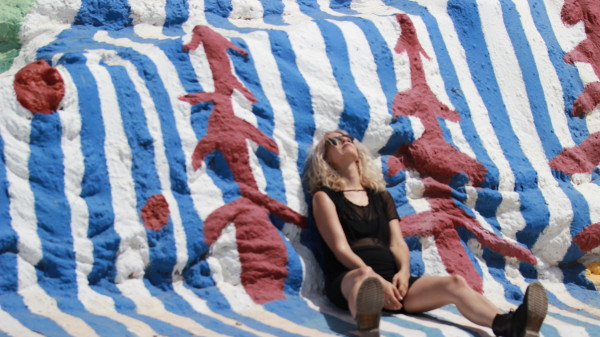
MM: I’ve always bought vinyl. In the ’90’s most of what I bought were like dance remixes because the Djs were all still using vinyl back then and there were always promos floating around with really cool remixes and stuff. But when they started issuing albums on vinyl again I started buying vinyl primarily about six years ago and the thing that I’ve seen change is that the prices have gone up substantially.
DP: Mmm, hmm.
MM: When I started buying vinyl again the average price was maybe 21 dollars and now it tends to be more like 29.99 and then sometimes they split the record over two records and put it on the 180 gram vinyl – they want to optimize the sound quality – but I feel a little frustrated with that sometimes because not only does it jack the price up to like 40 bucks, you have to turn records over so frequently. You listen to two or three songs and you’ve gotta flip it over. I like flipping it over just the one time.
DP: Yeah. You know, it is frustrating. Because you never want the price to be prohibitive. I can’t speak from a business perspective but it seems like nobody knows how to make music financially solvent for artists anymore with the fact that people don’t buy records, so for labels it seems like the resurgence of vinyl is like partially an answer to that. But I understand the frustration for sure. It can get oppressive.
MM: On another note, do you think human beings will ever change their ways and save our planet or do you think they’re just going to continue to ruin it until we destroy ourselves?
DP: This is a question that I think about a lot. I was listening to Nina Simone last night and I felt like there are so many traces of that in her music. The same questions, she was asking about thirty years ago or whatever it was. It’s hard because I believe humans can individually change for the positive. I think anybody can change if they want to, and that’s the hardest, but when you’re dealing with collective consciousness you think about all the books that have been written about group psychology. It’s like, if everybody’s doing the same then it’s OK. It feels like we are consuming a lot more than we are creating. And the planet seems to be the last thing that we’re prioritizing when it seems to be the most [important]. So, I don’t know. It’s hard not having an apocalyptic vision for the planet even though I want to believe we can save it, you know?
MM: I recently watched a couple of episodes of Vice’s TV show on HBO and they went up to Antarctica and the rate at which it’s melting is shocking. They’re there filming and all of a sudden in the background you see a huge glacier come crashing down into the water.
DP: It’s so sad. I think about it every time I recycle a plastic bottle. There’s this video that went viral earlier last year of some island where all of this plastic has accumulated and all of these birds are eating it and getting super sick and dying and really suffering. And it’s our mistakes, you know? It’s our ignorance because the planet is one of those things where you don’t see the direct impact immediately and we’re such an instantaneous culture that people aren’t thinking about the the long-term, of taking care of the earth.
MM: One thing they were saying is that the demand for krill – because everyone is taking it now that it’s been heralded as the new wonder pill – is causing problems with there being too much water because they’re breaking glaciers down to get it. And that’s just one thing. People start taking that stuff and don’t research what the potential effects on the environment are if we start harvesting this.
DP: I know. And I hate to sound like such a cliché but it’s all capitalism. The mentality of capitalism where a few people have no limits to what their greed can accomplish with money. And what they end up doing is ruining the resources for everyone. It becomes a battle for resources.
MM: I wonder what they’ll do when it reaches the point that cities like Boston start ending up under water because sea level just keeps rising.
DP: Yup. It’s only a matter of time. It’s like, my last days in New York, I started to feel so doomed. Because of that. Especially being there for Hurricane Sandy and seeing the water literally swell up. Watching that really had an impact on me.
MM: What are your favorite areas in California?
DP: Um, well, I have had a lot of fun exploring the various canyons and going to the ocean, which is so amazing to me, that you could be out here and drive fifteen minutes and be in these gorgeous places.
I live in Echo Park, which is cool. It’s a nice creative community. Even downtown. I do still miss New York in spite of the things that drove me to leave there. So, it’s nice to be in a little slice of something that feels familiar.
MM: Where were you originally from?
DP: I’m from Syracuse, New York. This is a big change for me.
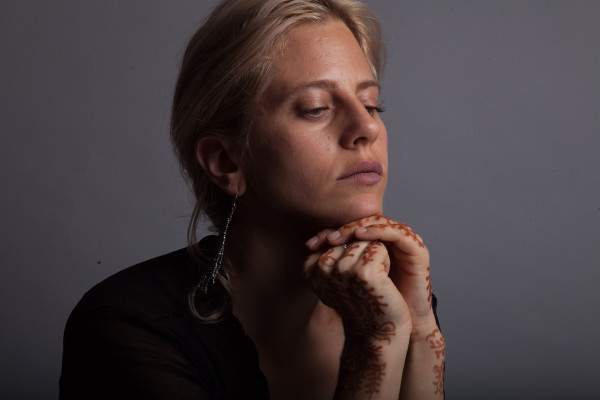
MM: I was wondering, since change and rebirth are common themes in your songs, do you believe in reincarnation?
DP: For sure.
MM: I do, too.
DP: Oh, good. What made you believe in reincarnation?
MM: Well, one of the things is that I believe in spirits because I’ve seen a couple in my lifetime. And my great grandmother had this thing she could do to take away burns and my sister grabbed a boiling hot cup of coffee when we were camping when she was about three. She ended up at Shriner’s Burn Institute in Boston and they were talking about skin graphs and how she could be there for three months. But my mother prayed to my great grandmother, who had since passed, and less than two weeks later my sister was fine and the doctors said, “We’ll just have to write this one off as a miracle.”
DP: That’s the thing, right?
MM: So, I figure if she could do that while she was alive and apparently even from beyond, there’s definitely connections between this world and wherever else there is.
DP: Absolutely.
MM: Why do you believe in reincarnation?
DP: I think there have been a few truly mystical moments in my life where I’ve tapped into something that is beyond myself and my experience in this body. A friend of mine once took me to see a highly revered Tibetan monk who I knew very little about. We were on a long line of people to greet him and he was giving each person a little red string as a form of a blessing. I didn’t think much of it but the moment he handed me the string and caught my eye, I felt a electric shock run through my body that felt like the past, present and future colliding. For a few days after, my dreams were lucid and carried messages that would play out in the days following.
MM: As you probably know, The Weeknd started off just giving away free mixtapes as a very underground artist, writing his songs himself, but now he works with big mainstream pop songwriters like Max Martin, who I believe he wrote “I Can’t Feel My Face” with, and that’s obviously a huge hit. My question is, can you ever see yourself writing songs with mainstream pop songwriters and aiming to top pop charts?
DP: I’m not sure. I think if there was a message that I thought was important to be delivered in a huge way I could see it happening. But my ambition is for people I typically work with [to] speak some sort of truth in their work and are not just out to have people be…
MM: With a lot of them, it seems to be about generating sales.
DP: Exactly. Exactly. Again, it comes back to the capitalism of art. It’s a constant threat to having a genuine experience.
MM: Now I have a few questions from our random questions bank. The first one is: have you done any TV interviews yet? If so, did you like doing them?
DP: I’ve only done a TV interview once at South By South West years ago, which I was pretty nervous for. I have one next week with KEXP.
MM: Was the experience intimidating when you did that one?
DP: Yeah, I think I was a little intimidated. [But] the interviewers weren’t intimidating.
MM: Do you ever take advice offered in negative reviews?
DP: Yes. You have to do what feels right for you and honest, but I’m interested in getting better, too. And figuring out what’s not resonating and what is to continue honing my craft so the music can be accessible and really reach people. So, it’s important for me to take my criticism and see if it works, if it’s something I can see in the music, too.
MM: The last random question is a somewhat weird one maybe. What toys did you play with when you were around ten years old?
DP: Oh, man. Um, there’s some sort of thing that you put on your ankle – I’m forgetting what it is – and you have to spin it around in circles and jump over it. I feel like a lot of outdoor toys. We were growing up outside all of the time. And maybe a karaoke machine. I think my parents got me a karaoke machine.
MM: That’s where you got your start, apparently.
DP: [Laughs] Yeah, it all started with karaoke.

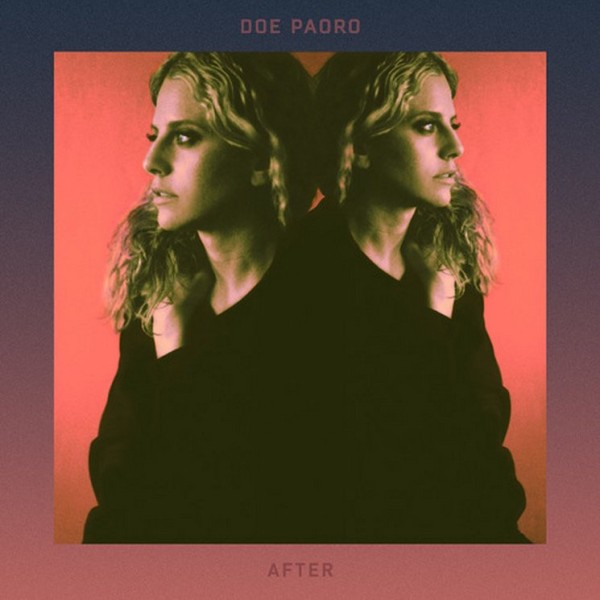
Leave a Reply